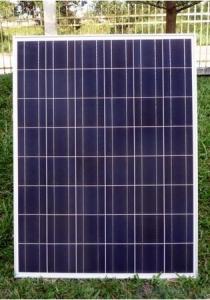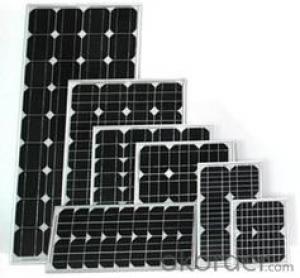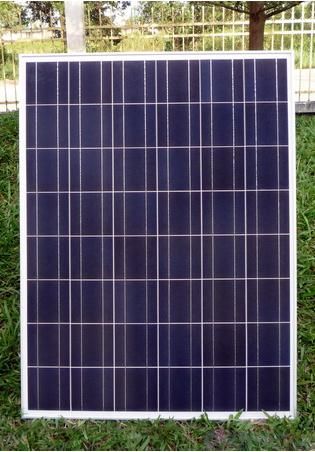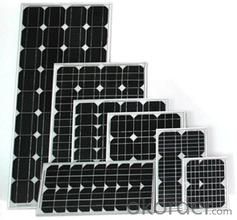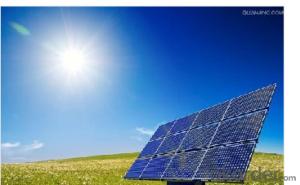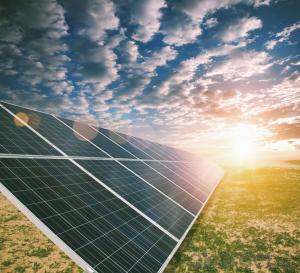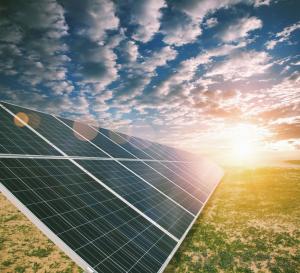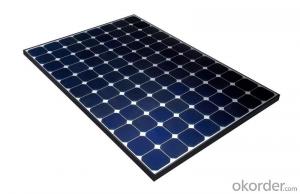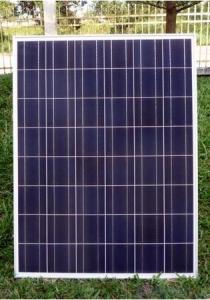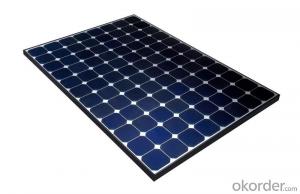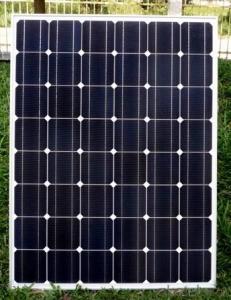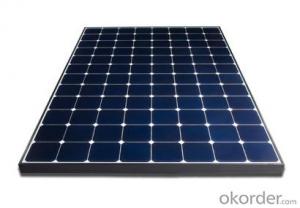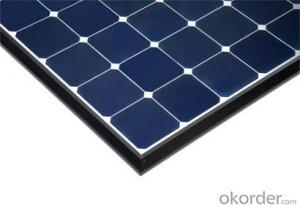Floating Solar Panels - CNBM Poly 240W Solar Panel with TUV UL CE Certificate for Residential
- Loading Port:
- Shanghai
- Payment Terms:
- TT OR LC
- Min Order Qty:
- 100 watt
- Supply Capability:
- 1000 watt/month
OKorder Service Pledge
OKorder Financial Service
You Might Also Like
Specification
CNBM Poly 240W Solar Panel with TUV UL CE Certificate For Residential
Introduction
Electrical connections are made in series to achieve a desired output voltage and/or in parallel to provide a desired current capability. The conducting wires that take the current off the modules may contain silver, copper or other non-magnetic conductive [transition metals]. The cells must be connected electrically to one another and to the rest of the system. Externally, popular terrestrial usage photovoltaic modules use MC3 (older) or MC4 connectors to facilitate easy weatherproof connections to the rest of the system.
Solar modules use light energy (photons) from the sun to generate electricity through the photovoltaic effect. The majority of modules use wafer-based crystalline silicon cells or thin-film cells based on cadmium telluride or silicon. The structural (load carrying) member of a module can either be the top layer or the back layer. Cells must also be protected from mechanical damage and moisture. Most solar modules are rigid, but semi-flexible ones are available, based on thin-film cells.
In contrast, a solar thermal collector supplies heat by absorbing sunlight, for the purpose of either direct heating or indirect electrical power generation from heat. A "photoelectrolytic cell" (photoelectrochemical cell), on the other hand, refers either to a type of photovoltaic cell (like that developed by Edmond Becquerel and modern dye-sensitized solar cells), or to a device that splits water directly into hydrogen and oxygen using only solar illumination.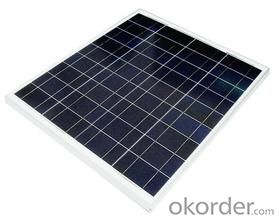
Suggested application
Home lighting business lighting,
Garden lighting, pavement lighting
Farmer household lighting
Decorative water pump
Traffic signal lighting
Industry area
Business area
Solar Power Plant
Product feature
Modules are made of Monocrystalline or Polycrystalline Silicon cell.
Materials and color of the solar panel frame: Clear anodized aluminum alloy type 6063T5 Universal frame; Silver-white color;
The output connection gathers the coupling: Selects conforms to the IEC-612615; 2005, class II, IEC61730 international standard; Airtight waterproofing binding clamp;
Module seal structure: The surface is thick, the high diaphanous rate armored glass with solar cell board special-purpose 3.2mm becomes after the high temperature lamination craft. The back selects has waterproof and anti- aged performance fine TPT materials. The entire block battery board has, the waterproofing, the anti- aging airtight and so on the fine performance;
Power tolerance: +/-3%
Packaging
International standard cartons (according to the requirements of customers)
- Q: Can solar panels be installed on theme parks or amusement parks?
- Yes, solar panels can be installed on theme parks or amusement parks. In fact, many parks are increasingly embracing renewable energy sources like solar power to reduce their carbon footprint and energy costs. Installing solar panels on theme parks can not only provide clean and sustainable energy but also serve as a visible demonstration of their commitment to environmental sustainability.
- Q: How do solar panels interact with the electrical grid?
- Solar panels interact with the electrical grid through a process called net metering. When solar panels generate excess electricity, it is fed back into the grid, and the homeowner or business owner receives credits for the energy they contribute. During times when solar panels do not produce enough electricity, such as at night or on cloudy days, energy is drawn from the grid to meet the demand. This bidirectional flow of electricity allows solar panel owners to offset their energy consumption and reduce their electricity bills.
- Q: Please tell me what they are made of and how the materials help the solar cell produce electricity. Im doing a science projects so i need help on knowing all this info. Its a debate, so i need correct information please.I will please need more information about the bad things about solar energy and solar panels. Please say what solar panels do to create pollution or do anything that is not friendly to the environment. If you want just give me a website. Thank you
- Solar cells are mainly made of a semiconductor called silicon,when sunshine on it,solar energy is converted into electrical energy by photovoltaic.The energy knocks electrons loose, allowing them to flow freely.This flow of electrons is a current, this current, together with the cell's voltage (which is a result of its built-in electric field or fields), defines the power (or wattage) that the solar cell can produce.
- Q: Can solar panels be installed on government buildings?
- Yes, solar panels can be installed on government buildings. In fact, many governments around the world are actively promoting the adoption of renewable energy sources, including solar power, in their buildings to reduce carbon emissions and promote sustainability. Installing solar panels on government buildings not only helps in reducing energy costs but also sets an example for the public and encourages wider adoption of renewable energy.
- Q: I was trying to figure out if I could run an electric heater off of a solar panel, but I don't understand these electric convertion factors and stuff. Would it work? (I know it'll only work in the daytime and stuff.)SOLAR PANELPeak Power 95W PTC Watts 73.0WVoc 30.7VPeak Voltage 24.4VIsc 8.6APeak Current 7.96A HEATERInput: 20 V/60 Hz ,500 W/5,200 BTU
- You will have to run the solar panel to a 2v or 24 v battery array that use an inverter to convert the battery power to 20 for the heaters.
- Q: I want to buy a solar panel to charge deep cycle batteries and charge electronics off the DCB. I don't know how to wire everything up though or what materials ill need. Inverter? Gauge of the wire? Ampmeter?
- It does not matter if you father is a electrician he must be a fully qualified solar installer or you will not receive any money from the government. You need more than just solar panels you need regulators, grid interaction devices and array controller. 5KW installation is large and will cost around $5000 for the panels then around 5000 for controllers and equipment needed and then there are the basic materials such as rails, junctions, cables etc Total cost is approx $5,000
- Q: What is the impact of tree shading on solar panels' efficiency?
- The impact of tree shading on solar panels' efficiency is negative as it reduces the amount of sunlight reaching the panels and therefore decreases their energy production.
- Q: Can it be used on a cellphone so u never have to worry about low battery?
- Solar panels (arrays of photvoltaic cells) use renewable energy from the sun, and are a clean and environmentally sound means of collecting solar energy. Solar panels are a great way to generate electricity on a small scale. Solar panels are commonly named solar cells or photovoltaic cells. Photovoltaic means literally light electricity.” Solar cells or PV cells rely on the photovoltaic effect to absorb the energy of the sun and cause current to flow between two oppositely charged layers. Solar panel installation is a cost effective part of the green movement for saving energy. There are different types of solar panels available, including Monocrystalline Panels, Polycrystalline Panel, Cast Polycrystalline Panels, String Ribbon Silicone Panels and Thin Film Panels. Find more information about solar panels at this Web site:
- Q: What sort of maintenance is required for solar panels....?
- All panels should be cleaned to function best. Brush or wash off dirt and leaves. They should be checked for structural integrity and lack of rust. Solar Thermal panels should be checked for signs of leaks and/or discharge from pressure relief valves. Solar Photovoltaic should be checked for electrical function and grounding.
- Q: I am doing a big project for school, and I have decided to do it on solar panels. I am new to the subject but have done some research on it; I would like to buy a single panel, a charge controller, an inverter and a battery, to charge a simple lamp. My question is if the items in the links will work together and if the panel will produce electricity?
- Sounds like fun. A -watt panel doesn't need a charge controller, though. In fact, it may take more than watt to power the charge controller. With a low-wattage panel, you can just connect the panel directly to the battery. A 7 amp-hour gel cell (the kind used in burglar alarms) would be good for this purpose. The panel is too small to charge a car battery. The gel cell should power that inverter, but only for a few minutes. If you want to be more impressive, look for a low power, 2-volt device. An iPod plus a 2-volt car adapter would be an example.
Send your message to us
Floating Solar Panels - CNBM Poly 240W Solar Panel with TUV UL CE Certificate for Residential
- Loading Port:
- Shanghai
- Payment Terms:
- TT OR LC
- Min Order Qty:
- 100 watt
- Supply Capability:
- 1000 watt/month
OKorder Service Pledge
OKorder Financial Service
Similar products
Hot products
Hot Searches
Related keywords
